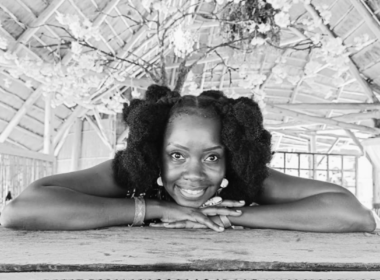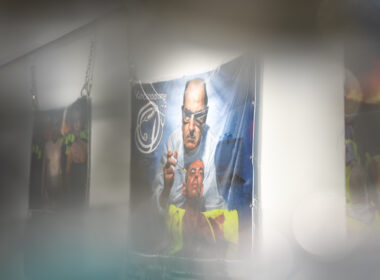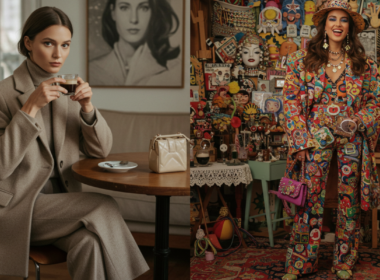Tabitha Odigili, a Nigerian-based artist known for her boundary-pushing creativity, takes us beyond traditional mediums in her latest work, “Painting Beyond the Canvas.” In this exclusive interview, she discusses her artistic journey, the inspiration behind her innovative approach, and how she continues to challenge the conventions of visual art.

FAB: How did your journey into art begin? Why and how did you choose painting as a form of expression?
Tabitha Odigili: My journey with painting began innocently, as a childhood hobby. I would draw on notebooks, walls, and chalkboards without thinking much of it. But as God will have it, there was a serendipic discovery one Saturday morning. I woke up earlier than usual, feeling an inexplicable urge to paint. With my parents and siblings still asleep, I snuck into my elder brother’s art supplies and took out old brushes and oil paints. I was drawn to a calendar image of a traditional woman in Adire attire and felt compelled to bring her to life.
In that moment, something clicked. I painted with intensity, finishing the piece in under an hour. The sense of satisfaction I felt was profound. Years passed, and I didn’t realise the significance of that moment until I worked at an art gallery after secondary school. It was there that I understood the importance of art and decided to pursue it formally, studying fine arts at the university.
Looking back, I believe painting chose me that Saturday morning. Furthermore, to me, painting is like my language, of self-expression, my voice in any conversation. It’s a platform where I can share my thoughts, emotions, and experiences, connecting with others on a deeper level. Through painting, I connect first with myself and then with others, going beyond surface-level conversations. Painting makes me happy, and I feel glad that it sometimes helps others connect with their feelings. I hope my art inspires self-reflection, healing, and growth.
FAB: It is every artist’s joy to have their work commissioned. Can you recall your first art commission? How did you feel?
Tabitha Odigili: My first experience was a life portrait drawing of my primary school teacher, who generously paid me for it at the time. However, my first major commission was truly unforgettable. It was during the Female Artist Association of Nigeria’s 15th anniversary exhibition in 2016, held in collaboration with the Nike Art Gallery to celebrate International Women’s Day, that the renowned Mama Nike Okundaye purchased my painting, ‘Remain Bold and Beautiful,’ for N80,000 (eighty thousand naira). I felt excited about the money, but then I felt a sense of pride and confidence that she liked my work enough to buy it. This moment stands out for me as a milestone in my artistic journey, a memory I still cherish.
FAB: Your latest collection, Painting Outside the Canvas, explores new dimensions and seeks to push the boundaries with acrylics. How does this go with your dominant themes surrounding the importance of women in society?
Tabitha Odigili: As a female artist in a male-dominated industry, I wanted to do something different from the usual norms of painting that will also speak for me as a woman. It all started during the COVID-19 pandemic when I discovered a unique technique that would sort of become a signature style.
With limited art materials available at the time, I began collaging with dried-up paints on boards, creating distinctive textures and effects. This approach gave me the nudge for my concept of “painting outside the canvas.” This technique not only allowed me to push boundaries in painting but also helped to promote sustainability by repurposing materials considered waste.
Painting outside the canvas” symbolises the potential for women to achieve greatness despite obvious obstacles. It is unfortunate that some societies still undervalue womanhood. Women must empower themselves to push boundaries. Just like “the acrylic collage,” each piece plays an important role in the overall work that leaves a lasting impression of the art work. Also, women’s contributions are unforgettable. Beyond physical beauty, women must project their strength and resilience, challenging biases and social norms. You don’t need a high-profile position to make a difference. Your influence can be felt in your daily life, whether through raising your children, managing your home, serving in the church/ mosques, market, office place, contributing to the community, or excelling in your career. Every effort counts, and collectively, we can create a lasting impact.
Similar to this style of painting, it literally says there are no limits to what one can achieve. Women can embrace their unique strengths and strive for success no matter what it takes. Through this art style, I aim to inspire young women to challenge harmful social constructs and embrace their individuality.

FAB: Do you have any peculiar creative processes?
Tabitha Odigili: My creative approach combines planning and spontaneity, starting with ideation then implementation, meaning from sketching, drawing, painting, and framing of finished work. I explore Nigerian traditional symbols and signs in portrait paintings, which can sometimes create accidental patterns, but I enjoy interpreting the energy of Lagos’ landscapes, from bustling markets to peaceful beaches, which requires more planning. I draw inspiration from everyday life in Lagos, where the atmosphere and people motivate me to want to experiment with new materials and techniques. Sometimes, I take a break from painting, like a day or more, to attend to other things.
Some of the challenges I face, besides the cost of materials, include dealing with the locals or natives in certain areas, who can sometimes be hostile. For instance, I once encountered trouble with hoodlums while capturing a local market scene; my phone was almost seized by these hoodlums. However, the rewarding part in the end is bringing my ideas to life on canvas, or “outside the canvas,” as the case may be.
More Like This:
Art Care: How to Care for Your Paintings
FAB: What is your take on how African art is perceived by Africans and foreigners?
Tabitha Odigili: The appreciation of African art has come a long way, growing significantly. And I think that despite the shadows of colonialism, our art has always been valued in a sense—evidenced in the exploitation and removal of our artifacts. The misconception or stereotype that African art is only about dark magic, fetishes, and spirituality is gradually fading. In fact, I would say it is being replaced by a more nuanced understanding. Through cultural exchange, many are becoming collectors, buying works and crafts from African artists, and by so doing, helping to shift the narrative about African art. As a Nigerian artist, I would confidently say that there is better appreciation of the richness and diversity of African art, which in turn has led to a growing demand for our works, and I am glad that African art is gaining more global view through the lenses of both Africans and foreigners alike.
Tabitha Odigili: Throughout my career, I have been fortunate to collaborate with various artists through exhibitions, workshops, art shows, and residency programs. One memorable experience was participating in Pier Arr, an open-air outdoor painting session where artists volunteered to create art for patients in a general hospital. I met new friends and fellow artists, and we took breaks at some point to enjoy street snacks and drinks engaged with some locals in small talks.
It was inspiring to see artists give their skills, time, materials, and talents to produce amazing works, which were then given to the Arts in Medicine Fellowship as donations to the hospital. Seeing the smiles on their patients absolutely made my day. Hopefully I look forward to more collaborative experiences like this.

FAB: Do you see a need for collaboration in this medium of art expression as it is with other forms of art?
Tabitha Odigili Absolutely yes. I believe collaboration is essential in this medium of art, just as it is in other forms of art. Ultimately, our shared goal is to cause and drive positive change. I can imagine a community of artists who engage in recycling art, transforming discarded paint materials into beautiful art pieces. Meaning, on a larger scale, the more artists who learn to manage and reuse paints, the better. Together, we can each contribute our quota towards creating a more sustainable future.”
FAB: What single/major/apt message do you hope your works uphold in centuries to come?
Tabitha Odigili: For centuries to come, I hope my art continues to celebrate the beauty and diversity of Nigerian heritage. That it leaves a lasting legacy, preserving its essence. I hope for my work to serve as historical documentation of my era or time, showcasing the vibrant stories, landscapes, culture, and traditions of my people with the world. Through my art, I wish to create an appreciation understanding of Nigeria, redefining global perceptions of my country and continent.
FAB: Lastly, what does success as an artist mean to you?
Tabitha Odigili: As an artist, success means being true to myself and growing in my craft. I want to use my art to inspire and uplift others, especially women and those who need it most. Leaving a lasting impact particularly on women and the underserved and being remembered for my contributions. That is what success looks like to me. Stay up to date on the latest in fashion, arts, beauty, and lifestyle by following FAB L’Style Magazine.
















